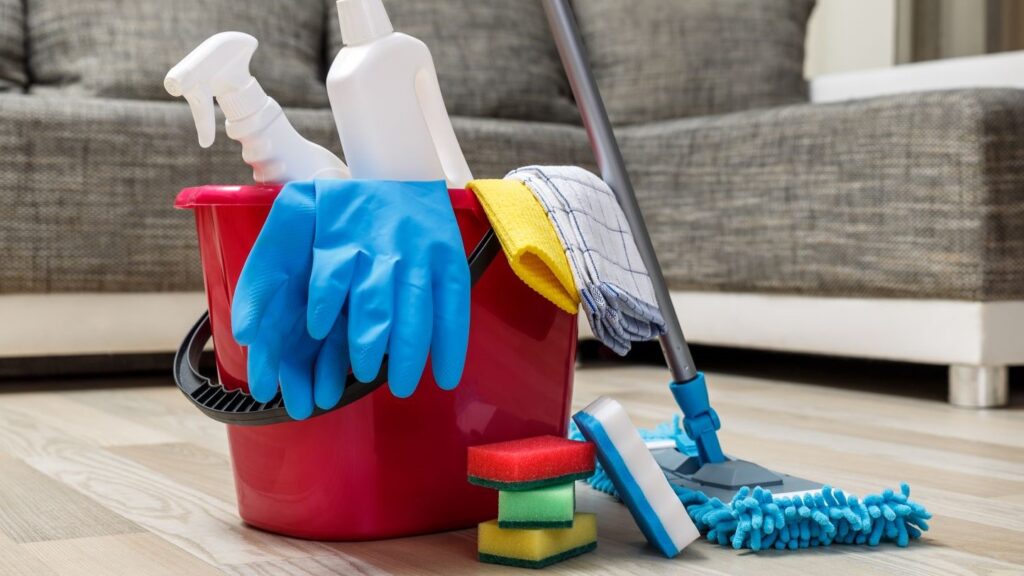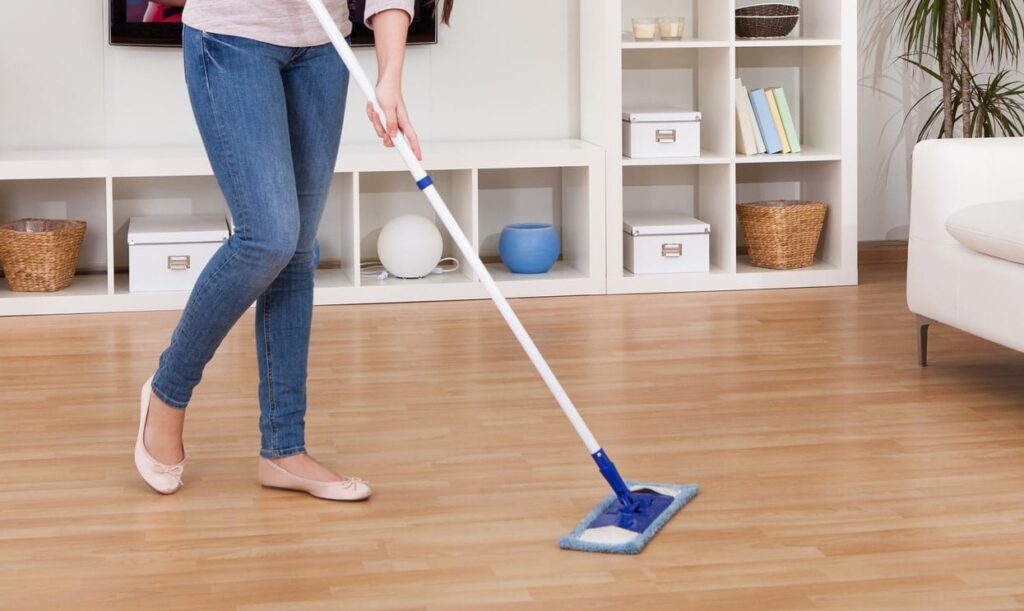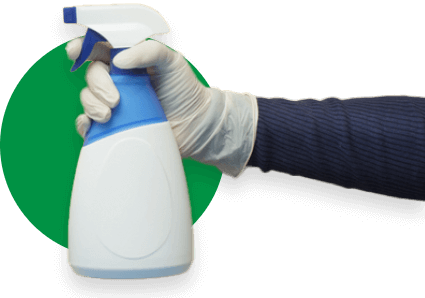It is important to maintain a proper level of cleanliness. Whether it’s a public place or a household, cleanliness is mandatory in preventing the spread of germs and infectious diseases. Many times, this will involve disinfecting hardwood floors.
Throughout the day, shoes, bare feet, and pets can accumulate a significant amount of viruses, germs, and bacteria. Therefore, it is essential to know how to disinfect hardwood floors.
With this helpful information, you will know what cleaning solution to use and how often you should disinfect your hardwood floors.
What Tools and Materials Do You Need to Disinfect Hardwood Floors?
In order to properly disinfect hardwood floors, you will need a variety of materials. To start, you should always use a broom and dustpan. Furthermore, you will need a wood-safe cleaning solution. Depending on the size of the floor, you may need a microfiber cloth or mop. In addition, you should always use a clean cloth. All of these materials are necessary and will increase the cleanliness of your hardwood floor.
Preparing Your Hardwood Floors For Disinfection
Before you apply the disinfecting solution, sweep the hardwood floor. This will remove any visible dust and debris. By doing so, you may notice stronger results. In addition, this can prevent your floor from being damaged. If you are dragging crumbs or dirt around, the floor may get scratched. It is important to note that sweeping hardwood floors is useful, regardless of whether or not you plan to disinfect. Vacuuming is also quite effective.
Disinfecting Solutions to Use and Not Use
There are a variety of safe, disinfectant hardwood floor cleaners you can use. It is essential to look for products that are anti-bacterial and will not leave a residue. Understandably, you want your hardwood floors to look new and shiny.
You should also be wary of solutions that contain harsh chemicals as they may damage your floor. Many times, labels will recommend diluting the solution with warm water. However, be careful as to not over-dilute as this may reduce its effectiveness.
Bleach
Although it can be an effective chemical disinfectant, it is not recommended to use bleach as a disinfecting solution for hardwood floors. Since bleach contains harsh chemicals, it can damage the wood and distort its color.
In addition, the removal of bleach stains may require full restoration and replacement. Depending on the type of wood, bleach disinfectants can have differing levels of strength. However, it is generally advised to not use bleach.
Similarly, you should avoid using isopropyl alcohol, which can also damage hardwood floors.
Steam Cleaners
In addition to bleach, steam cleaners, and steam mops are not recommended methods for disinfecting hardwood floors. Yes, they are safe to use and effective against killing germs and bacteria. However, the vapors released from a steam cleaner can significantly damage hardwood floors.
In particular, you should avoid using a steam cleaner for laminate, engineered hardwood, and unsealed hardwood floors. Furthermore, certain flooring manufacturers may nullify the warranty for damage caused by steam cleaning.

Step-By-Step Guide to Disinfect Your Hardwood Floors
Here are the steps you should follow when disinfecting your hardwood floors. By following these guidelines, you may see greater effectiveness and longer-lasting results. Before applying the disinfecting solution, sweep or vacuum the floor. This will remove excess amounts of dirt, dust, and debris. It will also prevent potential scratches.
Afterward, apply the hardwood floor cleaner. You should avoid using products that contain harsh chemicals as they can damage the flooring. Depending on the instructions, you may need to dilute your disinfecting solution with warm water.
You can use a mop to apply the solution thoroughly for larger surfaces. Alternatively, you can use a microfiber cloth for smaller areas.
Once the solution has proper contact time, rinse the floor with warm water and use a clean cloth to dry the surface fully.
An experienced cleaning company can properly disinfect hardwood floors. Dallas Janitorial can provide these services in various supported areas.
How Often Should You Disinfect Your Hardwood Floors?
In general, household hardwood floors should be disinfected weekly. If someone is sick, disinfecting can prevent the spread of infectious illnesses. Furthermore, shoes can bring substantial amounts of viruses, bacteria, and germs into a household.
For high-traffic areas, this should be done more frequently. Crowded spaces with plenty of movement can be a hotspot for germ spreading. Therefore, it is essential to routinely disinfect the area.
Tips To Maintain and Clean Your Hardwood Floors After Disinfection
After disinfecting, hardwood floors should look new, shiny, and clean. However, this will not last forever as dirt and dust will begin to accumulate. This is especially true for high-traffic areas.
To properly maintain your hardwood floors, you should sweep or vacuum a few times per week. In addition, mopping can help keep your hardwood floor clean and sanitized. It is important to avoid using steam mops.

FAQs About Disinfecting Hardwood Floors
Does vinegar disinfect wood floors?
The effectiveness and reliability of vinegar as a hardwood floor cleaner are heavily debated. You can create a mixture of white vinegar and warm water. This solution can be applied to sealed hardwood floors. However, since vinegar is acidic, it can cause damage to wood floors.
How do you clean and disinfect old hardwood floors?
It is important to regularly sweep and mop old hardwood floors. Afterward, use a safe cleaning solution to disinfect it. For a better look, you can apply a new coat of polyurethane finish. This should be done every couple of years. Public places like offices should have a routine maintenance schedule.
What cleaner is safe to use on hardwood floors?
The safest cleaners for hardwood floors are ones that are effective and do not contain harsh chemicals. For easier use, it may be best to choose a cleaner that does not require dilution.
Can I use Dettol on a wooden floor?
Yes, you can use Dettol on a wooden floor. It will be useful for killing germs and bacteria.
How to disinfect hardwood flooring without using vinegar?
There is a simple cleaning solution that does not include white vinegar. You should apply a safe disinfectant product to your hardwood floor. Before doing so, make sure to sweep or vacuum the area as this will remove dust and dirt. After disinfecting, fully dry the surface with a clean cloth.
Interested in Learning More? Contact Dallas Janitorial Services
If you are interested in disinfecting services, you can contact us and get a free quote. Our phone number is 214-778-3689. We look forward to hearing from you and helping your floors shine like new.







